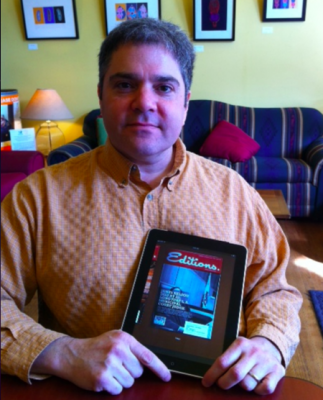AOL Finally Ready With Editions, Its iPad Magazine
After a nine-month gestation, AOL says its online iPad magazine is ready to meet the world.
Editions by AOL, as the app is known, should hit the iTunes store later today or by Wednesday morning at the latest. The app, as we have previously noted, is designed to be AOL’s entrant in the increasingly crowded field of personalized publications designed exclusively for Apple’s tablet.

Rather than passing out cigars or sending out birth announcements, AOL has been marking the app’s impending arrival in a less savory way. Inside company offices, AOL has replaced its standard toilet paper with specially marked rolls touting the product’s launch. The unusual marketing is due to the product’s internal nickname — The App For When You Crap.
In an interview, AOL mobile head David Temkin attempts to paint a more glowing picture of Editions, calling it more of a daily briefing giving you a mix of the news you want with the news you didn’t even know you wanted. Like a newspaper, Editions is organized into sections, such as local news, business, sports, entertainment and technology. Unlike a traditional fish wrap, however, users can elect which sections they wish to receive and which can be skipped.
The product will compete with a range of other products, including personalized readers like Flipboard, Zite and Pulse as well as the iPad-only Daily from News Corp. (which owns this site) and other iPad variants of traditional newspapers and magazines.
For now there are no ads inside Editions, but that is expected to change over the next couple of months, Temkin said.
Temkin said he is convinced there will be a niche for Editions.
“We’re not trying to be the be-all and end-all,” he said in an interview at AOL’s offices last week. Rather, Temkin said the team worked to create a publication that works well for one particular use — a good quick read of the news in the morning (hence the unfortunate and, I’m afraid, now permanent nickname.)
Unlike feed readers, Temkin said that Editions is a once-daily affair and features a set number of pages, allowing one to finish reading.
“This is huge,” Temkin said. “We want to give people a sense of ‘I did something, I finished this.'”
Indeed, the last page contains a horoscope and a note letting the reader know they have reached the end. Meanwhile, Temkin said that Editions is also unlike The Daily in that the AOL app is highly personalized based on one’s interests, with users able to vote up or down the sources and topics they want to see more or less of, similar to the way users can rate artists in the Pandora music service.
One of the challenges is that the app really needs continuous Internet service to be fully enjoyed, making it somewhat impractical for subway and train commuters whose Web access is inconsistent. Although headlines and some AOL-produced content are downloaded with the full magazine, users have to connect to the Internet each time they want to read a full article from another source, as the application loads a full Web page.
That move makes it more publisher friendly, given that Editions is scraping less content than some rivals, but could prove irksome to those on the go, or who have poor Wi-Fi reception in their restroom.
Editions also has some nice touches. It’s initial page features localized weather as well as a list of upcoming appointments taken from the iPad’s calendar and the week’s birthdays, taken from Facebook if a user chooses to link to Facebook. Although Editions doesn’t pull stories from Facebook or Twitter, it does let users link those accounts and uses the feeds for other information. If a user follows a particular publication on Twitter, for example, Editions will automatically make that a preferred source in Editions.









